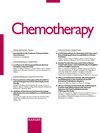槲皮素通过抑制糖酵解代谢抑制胶质母细胞瘤生长并延长生存率
IF 2
4区 医学
Q3 ONCOLOGY
引用次数: 5
摘要
槲皮素已被报道对多种癌症具有抗肿瘤活性,包括乳腺癌、肺癌、结肠癌、前列腺癌。本文采用U87MG、T98G细胞和GBM小鼠模型,研究槲皮素对胶质母细胞瘤(GBM)的保护作用,探讨槲皮素对GBM的抗肿瘤作用。方法:采用CCK-8法测定细胞活力、菌落形成和克隆形成。建立异种GBM移植小鼠模型,评价槲皮素给药和不给药小鼠的肿瘤负荷。通过脑立体定向注射U87细胞进行原位移植,观察小鼠的自主运动活动和存活率。采用海马法和Western blot法检测糖酵解代谢的变化。结果:槲皮素能抑制体外GBM细胞增殖,促进细胞凋亡。槲皮素抑制GBM生长,恢复自发运动活动,提高存活率,对体内外周器官无毒性。槲皮素抑制肿瘤组织糖酵解代谢。讨论/结论:从机制上看,槲皮素通过抑制GBM组织糖酵解代谢,抑制细胞增殖和血管生成,促进癌细胞凋亡,最终提高运动活性和生存率,提示槲皮素是治疗GBM的潜在药物。本文章由计算机程序翻译,如有差异,请以英文原文为准。
Quercetin Inhibits Glioblastoma Growth and Prolongs Survival Rate through Inhibiting Glycolytic Metabolism
Introduction: Quercetin has been reported to have antitumor activity of a wide range of cancers, including breast, lung, colon, prostate. Here, we investigated the protective role of quercetin in glioblastoma (GBM), which causes a higher risk of morbidity and mortality, and explored the antitumor effects of quercetin on GBM using the U87MG and T98G cells and GBM mouse models. Methods: Cell viability and colony formation assays were performed by CCK-8 and clone-formation assays. GBM xenograft mouse model was established to evaluate the tumor burden of mice treated with or without quercetin. To investigate spontaneous locomotor activity and survival rate of mice, orthotopic transplantation was performed through brain stereotaxic injection of U87 cells. Seahorse and Western blot were performed to examine the alteration of glycolytic metabolism GBM. Results: We found that quercetin administration inhibited GBM cell proliferation and promoted cell apoptosis in vitro. Quercetin suppressed GBM growth, restored spontaneous locomotor activity, and improved survival rate without toxicity to peripheral organs in vivo. Moreover, quercetin inhibited glycolytic metabolism in tumor tissue. Discussion/Conclusion: Mechanistically, quercetin inhibited proliferation and angiogenesis, promoted cancer cell apoptosis, and finally improved locomotor activity and survival by inhibiting the glycolytic metabolism in GBM tissues, suggesting that quercetin is a potential drug for the treatment of GBM.
求助全文
通过发布文献求助,成功后即可免费获取论文全文。
去求助
来源期刊

Chemotherapy
医学-药学
CiteScore
5.80
自引率
0.00%
发文量
34
审稿时长
6-12 weeks
期刊介绍:
This journal publishes original research articles and state-of-the-art reviews on all aspects of antimicrobial and antitumor chemotherapy. The results of experimental and clinical investigations into the microbiological and pharmacologic properties of antibacterial, antiviral and antitumor compounds are major topics of publication. Papers selected for the journal offer data concerning the efficacy, toxicology, and interactions of new drugs in single or combined applications. Studies designed to determine the pharmacokinetic and pharmacodynamics properties of similar preparations and comparing their efficacy are also included. Special emphasis is given to the development of drug-resistance, an increasing problem worldwide.
 求助内容:
求助内容: 应助结果提醒方式:
应助结果提醒方式:


